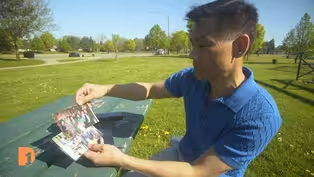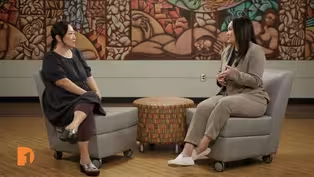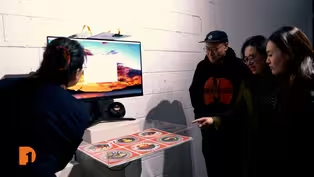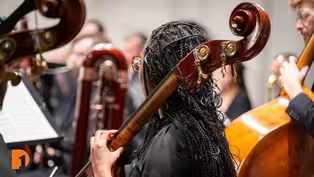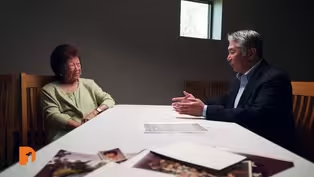
Japanese Incarceration, Being American, Threads of Passage, Fall of Saigon anniversary
Season 9 Episode 46 | 26m 46sVideo has Closed Captions
A One Detroit special episode in recognition of Asian American and Pacific Islander Heritage Month.
Stories for AAPI Heritage Month: Hear from a Japanese American woman about her experience living in an incarceration camp during World War II. Two Asian American women talk about growing up and what it means to be “American” enough. An interactive art exhibition shares and preserves stories of the Vietnamese American refugee experience. Plus, a Destination Detroit story about Vietnamese Americans.
Problems playing video? | Closed Captioning Feedback
Problems playing video? | Closed Captioning Feedback
One Detroit is a local public television program presented by Detroit PBS

Japanese Incarceration, Being American, Threads of Passage, Fall of Saigon anniversary
Season 9 Episode 46 | 26m 46sVideo has Closed Captions
Stories for AAPI Heritage Month: Hear from a Japanese American woman about her experience living in an incarceration camp during World War II. Two Asian American women talk about growing up and what it means to be “American” enough. An interactive art exhibition shares and preserves stories of the Vietnamese American refugee experience. Plus, a Destination Detroit story about Vietnamese Americans.
Problems playing video? | Closed Captioning Feedback
How to Watch One Detroit
One Detroit is available to stream on pbs.org and the free PBS App, available on iPhone, Apple TV, Android TV, Android smartphones, Amazon Fire TV, Amazon Fire Tablet, Roku, Samsung Smart TV, and Vizio.
Providing Support for PBS.org
Learn Moreabout PBS online sponsorship- [Host] Coming up on "One Detroit," we're bringing you stories and recognition of Asian American and Pacific Islander Heritage Month.
We'll hear from a Japanese American about her experience in an incarceration camp; plus, two Asian American women reflect on their childhood struggles.
Also ahead, we'll take you to an art exhibition, commemorating the 50th anniversary of the end of the Vietnam War; plus, a destination Detroit story, focusing on Vietnamese Americans.
And we'll give you some ideas on how to spend this weekend in metro Detroit.
It's all coming up next on "One Detroit."
- [Narrator] From Delta faucets to Behr paint, Masco Corporation is proud to deliver products that enhance the way consumers all over the world experience and enjoy their living spaces.
Masco, serving Michigan communities since 1929.
Support also provided by the Cynthia & Edsel Ford Fund for Journalism at Detroit PBS.
- [Narrator 2] The DTE Foundation is a proud sponsor of Detroit PBS.
Through our giving, we are committed to meeting the needs of the communities we serve statewide to help ensure a bright and thriving future for all.
Learn more at dtefoundation.com.
- [Narrator] Nissan Foundation, and viewers like you.
(steady music) - [Host] Just ahead on "One Detroit," May is Asian American and Pacific Islander Heritage Month, and we are sharing stories from the AAPI community.
We'll meet two Asian American women who struggled with their identities growing up; plus, a new art exhibition focuses on sharing and preserving stories of the Vietnamese American refugee experience.
Also, on Sunday, our Destination Detroit project will collect oral histories from the local Vietnamese community, and we'll run down some of the arts and culture activities taking place this weekend.
But first up, as part of our AAPI story series, a conversation between two Japanese Americans, Mary Kamidoi talks with Shinji Takahashi about her experience growing up.
Both are second generation Japanese Americans, known as nisei.
As a child, Kamidoi and her family were forced to live in a Japanese incarceration camp in Arkansas, while Takahashi grew up in Ann Arbor and learned about the camps in high school.
(steady music) - Could you describe from the day that you were in your own house in Stockton, California, and now you're in the barracks amongst all these other people, like six to 8,000 people, could you kind of describe how you tried to adjust to that situation?
- Well, you know, when we went in, you were assigned rooms and, you know, and you didn't know the people that were in your block, how they arranged the rooms.
- It says here, 41-9-F. - [Mary] Yeah.
- [Shinji] That was the barrack number.
- And so we really didn't know anybody, all the neighbors alongside, and there's 12 barracks.
All the parents used to tell all the kids, "Be careful who you talk to."
So, you know, they were constantly telling us that because they didn't know who the strangers were.
They thought maybe they might have been working for the government.
- Oh, I see.
- Our parents kept telling us, "Don't talk to strangers.
And if you do, don't say anything about the family."
- Now you're in a situation where your parents are highly suspicious of anything.
- That's right.
Because actually, you know, I lived in 41, and I couldn't tell you that I knew this one and I knew that.
I didn't know a soul in the 12 barracks.
And so, nobody else knew anybody else.
So I think all the parents probably told their kids.
- Do you think the same thing was told to every child at every family?
- I'm sure the parents did.
- Your parents were not unique in that caution?
- I'm sure the parents told their children, "Don't talk to strangers and don't tell 'em anything about the family," because, you know, when they went and took so many people right when the war started, the isseis that were businessmen in town and church leaders and all, they just went in the middle of the night, broke in the houses and just took 'em.
And so because of that, the isseis got a little worried about, maybe the kids will tell them a lot of stories.
And so we didn't really become friendly with a lot of the people in our block.
- You are old enough to realize that, "Hey, I am an American born citizen.
Why is this happening to me?"
Did you ever feel that way?
- Well, yeah, we all felt that way.
But the thing is, you know, you can't fight the government, so.
- Did that feeling of like, you know, this is unfair, did that last a long time?
- It is.
We said that in the camp amongst ourselves, you know, but you know, there was nothing we can do.
So we just sort of let it go.
- How long did it take you to finally say let it go?
I mean.
- Oh, it didn't take me that long because I just figured, hey, what am I gonna do?
I mean, there's nothing I can do about it.
- What about your brothers and sisters?
Did they feel differently?
Did they process it differently?
- No, they didn't because my dad was the kind of person that would have said to us, you know, it's happened, so you're gonna have to live with it.
So don't just keep dwelling on it because you're the one that's paying the price, physically and mentally.
- Have you talked to other people of Japanese descent that were in camp, once leaving camp, how they dealt with this?
I mean, it sounds like you, because your father were able to process it quickly, but.
- The niseis that I met, their parents really didn't talk about it and they didn't pressure the parents for any information about camp life because, you know, we're brought up to obey this and obey that and don't question things.
You know how these days were.
So they never questioned their parents.
And that's why today if you talk to some of these older niseis, they don't know half the story about evacuation.
They said, "How do you know so much?"
And I said, well because, I said, "I ask questions."
You can ask my mother.
She'll tell you, "Of the 10 children I have, you asked enough questions for a hundred people."
- So you're saying that of your nisei generation that were in camp, some of them were too young, some of 'em do have the experience, but they are uncomfortable talking about it?
- That's it.
- And you are very unique because you're very open and you're not uncomfortable talking about it.
So there are many stories out there that have just been left untold.
- That's right.
- So let's get back to the executive order 9066.
Only what you can carry, your family is, at this point unjustly, outta suspicion, put into the camp, you're at Rohwer.
What were your parents' attitude towards that whole action?
- Well, you know, the parents really were afraid, I think, to speak up because they weren't citizens, and they thought first thing they'll do is, they're gonna just pile us on a boat and send us back.
- So they had no idea what would happen the next day.
Even this order comes, they're thinking, "Oh my gosh, oh my gosh, what's gonna happen?"
- That's right.
- And that they may be put on a boat and sent back to Japan?
And they were very fearful of that?
- Well, you know, my dad and mom always talked about that, but, you know, really, the isseis really were not very outspoken in camp.
They were afraid to say anything, and maybe somebody would report them or something.
And so I could understand that.
And they were so ashamed of the fact that they couldn't defend us and keep us outta camp.
- Oh, so they as parents felt shame that they couldn't protect and provide for their children.
- And that's the reason why the isseis never spoke about it, very often, the camp life, even when they got out of camp.
- Because they couldn't function and act as parents.
- They couldn't help us out, and so they blamed themselves.
And so a lot of them nisseis don't know anything about the camp life.
- So you, being old enough as a young teenager and having three years of your teenager life in the camp, could you understand the shame that your parents might have felt by not being able to be a providing parent?
Did you understand that?
- Yes.
I could understand that.
- And you felt that.
- I could understand that, because, you know, you'd see the isseis just walking around, they had nothing else to do walking around, and they weren't speaking to anybody.
And, you know, I really felt sorry for the isseis, more so than, you know, myself or the niseis.
- Because you were old enough to realize that.
- [Host] Let's turn now to the story of Brenda Hu, a 2015 graduate of Michigan State University.
When Detroit was there when she reunited on campus with her former student advisor, Meaghan Kozar, in this excerpt from our AAPI story series, who reflects on her experiences growing up as a Chinese and Vietnamese kid in East Lansing.
Kozar shares her story of being a Korean child adopted by an Irish family in Minnesota.
- The last time I really colored out was probably like, college, I'd say, when I was blonde.
Do you remember that?
- Blonde?
I don't remember.
- Oh, good.
- I think it was more of a auburn, - I'm glad you don't remember.
- Or something like that.
- Yeah, not memorable.
- So my parents immigrated to the United States during the Vietnam War, and when they first came to the United States, they didn't have anything, and they grew up as immigrants.
English was their second language.
And I think always, you know, translating for them and seeing the hardships and the challenges that they faced early on as a child made me really want to be an advocate for them and to give them a voice.
But I didn't know how to do that.
And I think as a child, growing up in East Lansing, Michigan, I always saw myself as not Asian enough.
Because even though I spoke Vietnamese, you know, it wasn't super great.
It was very casual.
And even though I spoke English, when I went to school, like no one really looked like me.
I wanted Lunchables for lunch, but instead, I got like fried rice because my mom was packing that for me at home.
And looking back at it as an adult now, like I admire and I'm so grateful for everything that my parents gave me, because it was the best that they could do.
And I don't think that I knew that being an Asian American was an identity option until I realized that Asian Americans were a thing.
And I didn't learn that until I went to college, because I think growing up, I didn't learn about Asian American history in school.
It was just US history.
And when we did learn about Asians, it was very much overseas.
And I was born here and I grew up here.
So I never felt Asian enough and I never felt American enough until I realized that that was an option, which you, Meaghan, helped me learn, actually.
- So my experience with being Asian and American is very interesting.
So I was adopted at the age of two from Seoul, Korea, and I was adopted into a white family in Minnesota.
- [Brenda] Yeah.
- [Meaghan] And it's interesting that from hearing your story and how I've impacted you or influenced you through being Asian American, my whole life was surrounded by trying to prove that I was Asian American, or I was not even Asian, but American because my schools, my neighborhood, my environment was all white and I was always reminded that I was Asian.
So even though I didn't have an accent, even though I didn't speak any Asian language or, you know, anything associated or stereotypical, ways we associate what an Asian is.
- Yeah.
- My traditions and my holidays, my customs, all of that were white.
- Yeah.
- And I didn't know another language.
So interestingly, I mean, there was one example.
I remember I went to elementary school, a private Catholic elementary school.
- Okay, mhm.
- And we always had to go to church, and they celebrated St. Patrick's Day.
And the priest asked the people in the audience, they said, you know, "If you're Irish, raise your hand."
And so I raised my hand.
- Okay.
- And the reason why I raised my hand, the priest had reached out and told my mom and he was laughing at it and they said, "Oh, how cute."
And I didn't understand what the issue was.
And the reason I raised my hand is because my name is Meaghan, and I was always told, it was spelled the Irish way.
- Oh!
- Yeah.
M-E-A-G-H-A-N, right?
- Yeah, yeah.
- And so my sister's a Shannon, my mom a Sheila.
And so to me, my identity was American.
- Yeah.
- And so to me, I always embraced, you know, being an American, just being, you know, just.
- Yeah.
- But I was always reminded I was Asian.
But when I came to other, you know, the universities, when I came to college and being a part of Asian American, you know, student organizations or activists areas, the perception is, I'm not Asian enough, right?
Ironically, I could be viewed as more Asian than something, 'cause I was actually born in Asia, right?
- Yeah.
- So it's a very complex, complicated.
- Yeah.
Yeah.
It's such a complex thing.
One identity, two ethnicity, and you know, how you define yourself, it comes back to labels, right?
Because I was also always reminded that I was Asian, especially at school when I worked, you know, at Abercrombie and Fitch because that was the cool thing to do back then.
Instead of just being like a great employee or being a great student or friend, I was always labeled as like, "Oh, you're my Asian friend.
Oh, Brenda's the best Asian employee that we have."
And I always thought, why do you need to label me?
Like, why can't we just be, and why can't we just be a part of society and fit in like we want to?
I think that's why, understanding my identity as like an Asian American was so important.
- [Host] Detroit artist, Linh My Truong, reflects upon the diverse history of the Vietnamese American diaspora in her new exhibition at the Annex Gallery in Highland Park.
The exhibition, which runs through May 18th, is titled, "Threads of Passage: From Vietnam to America."
Truong uses interactive technology to share family stories commemorating the 50th anniversary of the end of the Vietnam War.
- [Linh] My name is Linh My Truong, and I'm a visual artist based in Detroit.
Love to collage together different types of videos and images to create narratives.
But for this piece, the narrative is my family's story.
So that was really important for me to treat that with respect and to represent that properly.
And it's the first artwork I've done at all about my heritage.
(person speaking indistinctly) - [Linh] When I started this project, I really wanted to get stories from refugees themselves, because that generation is dying out and they're my parents' generation.
But I was surprised at how many younger Vietnamese were embracing this idea of gathering oral histories.
So I really opened it up to like, if even if you didn't experience the journey yourself, this is a great opportunity to ask your elder, to ask your grandparents, your parents about their experience, or even just talk about how their voyage, their refugee experience impacted your life and your identity in America.
The open call really was very wide reaching in terms of the stories and different generations.
So I'm really pleased about that.
My background is in textiles.
I love the slow, meditative art form of weaving, embroidery, sewing.
About six years ago, I started incorporating electronics because I feel like there's a lot of opportunity to combine textiles with electronics for interaction.
Whenever I go to a gallery and I look at a textile exhibition, I just wanna touch everything.
That's just the nature of textiles.
So it's really frustrating for me when you can't.
So I'm trying to disrupt that idea you have in a gallery that you can't touch the art, and actually invite the viewer to interact with the piece.
But I find that, you know, the engagement really goes up if you allow people to interact with the work.
And in a sense, the viewer, the participant becomes part of the art itself.
- My mother's thread starts in Bac Lieu.
Rural southwest.
- They have a table here at my exhibition that's all Vietnamese American authors.
I wanted to include all of the cultural aspects in with this exhibition to give people a wider view of the amazing voices from the Vietnamese community.
- Just meeting you.
I wish my family was here.
- I've noticed a lot of my friends who are American and they are like fifth, sixth generation in, they know nothing about their heritage.
They're so far removed from it.
And I think that fact that I'm second generation, I was born in America, my parents came over and they had such a harrowing journey.
And my mom, she grew up in a village.
She was born in a village in the north where her ancestors had been for generations.
She doesn't know, you know, when they moved there.
It was just so many generations.
And then within her generation, she moved twice.
She moved from the north to the south and then left Vietnam for America.
So that's a pretty abrupt change from your lineage.
And I wanted to be the generation to record that.
So I wanted to capitalize on this moment 50 years after the war, so that it would last for future generations.
- [Host] As part of our Destination Detroit initiative, "One Detroit" is collecting stories, explaining how families ended up in Michigan.
This week, "One Detroit" senior producer, Bill Kubota, introduces us to residents with ties to Southeast Asia, including some from Vietnam who tell their family stories.
(bright music) (singers singing in foreign language) - [Hoa] For Michigan, in total, we have about 23, 24,000 Vietnamese, and then about 10% of all the total Vietnamese population here in United States.
I'm really excited and love about this because I have an opportunity for me to share my migration story to everybody.
You don't have that kind of opportunity, often.
- [Announcer] More stories of people coming to Southeastern Michigan, part of Detroit PBS's Destination Detroit project.
The Vietnamese journey, for most, began 50 years ago.
- [Hoa] This is the photo of my family back in 1984.
- The reason we left Vietnam, which is where I was born in 1975, because of the war, we left on a boat, stranded on sea, not sure where we're gonna be.
We landed in Thailand and then after that, we got sponsored from a church in Lansing, Michigan.
We came in the winter with flip flops, no coats.
Yeah, I was only five years old at the time.
- [Announcer] Hua Dinh wouldn't arrive 'til 1982.
His father worked with the US military, who was evacuated and settled in the Detroit area in 1975, unknown to Hua and the rest of his family.
- My mom was so happy, and she was just going crazy because, you know, for seven years, not knowing that your husband exists, right?
- Hua went to college, now a retired Ford motor company engineer.
The grand opening of a very large Vietnamese grocery store in Madison Heights, run by another family that made its way here.
(upbeat music) (people cheering) - [Hang] I thought there would be people but I didn't expect it to be this.
I'm overwhelmed.
It's my mom and I that owns the business, but it's a family that basically all works together.
This was a dream of ours ever since, you know, we took over in 2007 to have something bigger, more efficient.
Our old space was so small.
Our dream was always, one day, we're gonna go big and, you know, we're gonna give the city, the state, something that they needed.
We're from Colorado, so we're used to bigger stores.
We're used to like, bigger Asian stores.
When we came here, we knew there was a need for it.
It was just, we had to find the right place and the right time.
And I guess now is it.
It brings home to them.
They can't go home, but they can make food from home.
- [Hua] This year is 50th anniversary of the Fall of Saigon.
Because of that war that had torn so many family apart, so much pain and so much hurt that everybody had to endure.
We want our story to be heard and we want people to know that for whatever we went through, everybody can do it.
Everybody can make a new life in the new country that gives you freedom.
- [Host] This Sunday, May 18th, the Vietnamese American Association of Michigan is holding an event at the Hazel Park Community Center, commemorating the 50th anniversary of the Fall of Saigon from two to 5:00 PM.
The public is welcome.
One Detroit will be there to collect oral histories for our project, called Destination Detroit.
There are other AAPI events taking place around town this weekend, along with a selection of theater productions, art fairs, comedy shows, and museum activities.
Here's Peter Whorf from 90.9 WRCJ with today's "One Detroit Weekend."
- Hello there, I'm Peter Whorf with 90.9 WRCJ, and I've got some wonderful events to check out this week.
Starting off, "Lungs" is now at Tipping Point Theater through June 1st.
It's a raw, intimate story about a couple navigating love, fear, and climate anxiety in today's uncertain world.
May is Asian American Pacific Islander Heritage Month, and the Kylyn AAPI Arts and Culture Festival has many events taking place in Ann Arbor.
Friday, May 16, musicians Kyoto Aoki, Haruki Kobayashi, and Mai Sugimoto will perform an improvised score for a classic Japanese silent film.
On May 17th, the Ann Arbor Symphony Orchestra wraps up its 24, 25 season with a grand finale at Hill Auditorium, a night of beautiful music and celebration.
Then on May 18th, the Finders Keepers Biggest Spring Market returns to the Chelsea Community Fairgrounds, filled with vintage fines, handcrafted goods, and treasures waiting to be discovered.
And for comedy fans, the Detroit to L.A.
Comedy Challenge kicks off May 20th at Mark Ridley's Comedy Castle, where local comics compete for a spot on the West Coast stage.
And of course, stick around for even more events happening all around Metro Detroit.
(steady music) - Host That'll do it for this week's "One Detroit."
Thanks for watching.
Head to the "One Detroit" website for all the stories we're working on.
Follow us on social media, and sign up for our weekly newsletter.
- [Narrator] From Delta Faucets to Behr Paint, Masco Corporation is proud to deliver products that enhance the way consumers all over the world experience and enjoy their living spaces.
Masco, serving Michigan communities since 1929.
Support also provided by the Cynthia & Edsel Ford Fund for Journalism at Detroit PBS.
- [Narrator 2] The DTE Foundation is a proud sponsor of Detroit PBS.
Through our giving, we are committed to meeting the needs of the communities.
We serve statewide to help ensure a bright and thriving future for all.
Learn more at dtefoundation.com.
- [Narrator] Nissan Foundation, and viewers like you.
(steady music) (bright music)
Video has Closed Captions
Clip: S9 Ep46 | 3m 29s | Vietnamese Americans living in metro Detroit reflect on the Fall of Saigon 50 years later. (3m 29s)
AAPI Story Series | Brenda Hu and Meaghan Kozar: Am I American Enough?
Video has Closed Captions
Clip: S9 Ep46 | 5m 51s | Two women talk about their Asian American identities and what it means to be “American” enough. (5m 51s)
Interactive exhibition threads together Vietnamese American stories 50 years after Fall of Saigon
Video has Closed Captions
Clip: S9 Ep46 | 3m 30s | Artist Linh My Truong talks about her exhibit “Threads of Passage: From Vietnam to America.” (3m 30s)
One Detroit Weekend | Things to do around Detroit this weekend: May 16, 2025
Video has Closed Captions
Clip: S9 Ep46 | 1m 37s | A spring market, a collectibles fair, a comedy challenge and more events happening this weekend. (1m 37s)
Video has Closed Captions
Clip: S9 Ep46 | 6m 40s | Mary Kamidoi and Shinji Takahashi talk about the Japanese incarceration camps during World War II. (6m 40s)
Providing Support for PBS.org
Learn Moreabout PBS online sponsorshipSupport for PBS provided by:
One Detroit is a local public television program presented by Detroit PBS
